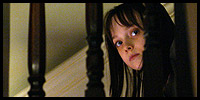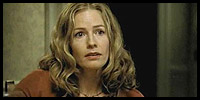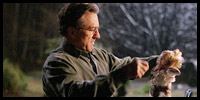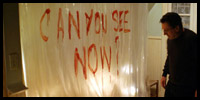
 |
|
Hide and Seek (2005) Cast: Robert De Niro, Dakota Fanning, Famke Janssen, Elisabeth Shue, Dylan Baker, Amy Irving, Melissa Leo, Robert John Burke, David Chandler, Molly Grant Kallins 2005 – 101 minutes Rated: Reviewed by Dustin Putman, January 26, 2005.
 "Hide and Seek" features two actors—one a veteran A-lister returning to his dramatic roots after a string of comedic misfires, the other quickly becoming the mostly rightfully in-demand child star of her generation—working at the top of their games. Unfortunately, the central game the film has up its sleeve is run-of-the-mill and decidedly banal, not worthy of either of their participation. Directed by John Polson with a similar sleek, stylish vigor he injected into 2002's "Swimfan," "Hide and Seek" is an absorbing mystery-thriller for its first hour, indelibly creepy and scrupulously paced, until it races off the tracks toward a dumb, albeit predictable, twist ending and violent, distasteful slasher movie conventions.
"Hide and Seek" features two actors—one a veteran A-lister returning to his dramatic roots after a string of comedic misfires, the other quickly becoming the mostly rightfully in-demand child star of her generation—working at the top of their games. Unfortunately, the central game the film has up its sleeve is run-of-the-mill and decidedly banal, not worthy of either of their participation. Directed by John Polson with a similar sleek, stylish vigor he injected into 2002's "Swimfan," "Hide and Seek" is an absorbing mystery-thriller for its first hour, indelibly creepy and scrupulously paced, until it races off the tracks toward a dumb, albeit predictable, twist ending and violent, distasteful slasher movie conventions.
 When her beloved mother, Alison (Amy Irving), commits suicide, 9-year-old Emily Callaway (Dakota Fanning) recoils in fearful and isolation. In an attempt to get her out of her shell and work through the grief, father David (Robert De Niro) decides to move Emily and himself away from the hustle and bustle of Manhattan and to a quiet country home in upstate New York. David and Emily are kindly greeted into the community of Woodland by neighbor Laura (Melissa Leo) and sweet divorcee Elizabeth (Elisabeth Shue), but it is a new imaginary friend named Charlie that finally starts to open Emily up. David is relieved to see his daughter's mood improving until disturbing occurrences—ominous messages written on the bathroom wall, dead pets—begin popping up in her presence. Emily insists the culprit is Charlie and not her. Does this unseen new friend really exist, or is Emily, indeed, a very sick little girl?
When her beloved mother, Alison (Amy Irving), commits suicide, 9-year-old Emily Callaway (Dakota Fanning) recoils in fearful and isolation. In an attempt to get her out of her shell and work through the grief, father David (Robert De Niro) decides to move Emily and himself away from the hustle and bustle of Manhattan and to a quiet country home in upstate New York. David and Emily are kindly greeted into the community of Woodland by neighbor Laura (Melissa Leo) and sweet divorcee Elizabeth (Elisabeth Shue), but it is a new imaginary friend named Charlie that finally starts to open Emily up. David is relieved to see his daughter's mood improving until disturbing occurrences—ominous messages written on the bathroom wall, dead pets—begin popping up in her presence. Emily insists the culprit is Charlie and not her. Does this unseen new friend really exist, or is Emily, indeed, a very sick little girl?
 There once was a time when the thriller genre was used to tell real stories in an organic, sensible fashion. No more. Since 1999's "The Sixth Sense"—a great film that, while shocking in its key climactic development, made perfect sense—shot out of the gate and blew audiences away, practically ever thriller has attempted to duplicate M. Night Shyamalan's success. None, however, have been able to. "Hide and Seek," which starts off with an alternately poignant and ominous premise—a child coming to terms, or lack thereof, with the sudden death of a parent—is no exception. Written by Ari Schlossberg, the film eventually unveils itself to be about nothing more than its corkscrew ending. The twist in question, meanwhile, is both glaringly obvious from almost the beginning and infuriatingly nonsensical. Those who have seen 2003's "Secret Window" or read the Stephen King novella it was based on, which this picture liberally borrows from, will have no trouble figuring things out long before they are disclosed. In fact, anyone who is paying even remote attention to what is onscreen will be ahead of director John Polson all the way through.
There once was a time when the thriller genre was used to tell real stories in an organic, sensible fashion. No more. Since 1999's "The Sixth Sense"—a great film that, while shocking in its key climactic development, made perfect sense—shot out of the gate and blew audiences away, practically ever thriller has attempted to duplicate M. Night Shyamalan's success. None, however, have been able to. "Hide and Seek," which starts off with an alternately poignant and ominous premise—a child coming to terms, or lack thereof, with the sudden death of a parent—is no exception. Written by Ari Schlossberg, the film eventually unveils itself to be about nothing more than its corkscrew ending. The twist in question, meanwhile, is both glaringly obvious from almost the beginning and infuriatingly nonsensical. Those who have seen 2003's "Secret Window" or read the Stephen King novella it was based on, which this picture liberally borrows from, will have no trouble figuring things out long before they are disclosed. In fact, anyone who is paying even remote attention to what is onscreen will be ahead of director John Polson all the way through.
 Also disheartening about "Hide and Seek" is its ultimate relegation toward cheap scares, questionable child endangerment, and pointless death scenes of both the human and animal variety. By the time many of its supporting characters have been picked off one at a time before and during its rainstorm-soaked climax (is there any other kind?), the film has forgotten about its initial honest intentions to become a mean-spirited slasher film fraught with sloppy developments and careless fatalities the movie refuses to be accountable for. It's all very ugly in the way it is handled, even if director John Polson remains skillful in ratcheting genuine tension out of the proceedings, and the patent, hook-laden final scene only further cheapens what has come before.
Also disheartening about "Hide and Seek" is its ultimate relegation toward cheap scares, questionable child endangerment, and pointless death scenes of both the human and animal variety. By the time many of its supporting characters have been picked off one at a time before and during its rainstorm-soaked climax (is there any other kind?), the film has forgotten about its initial honest intentions to become a mean-spirited slasher film fraught with sloppy developments and careless fatalities the movie refuses to be accountable for. It's all very ugly in the way it is handled, even if director John Polson remains skillful in ratcheting genuine tension out of the proceedings, and the patent, hook-laden final scene only further cheapens what has come before.
 The performances might have been put to better use in a more worthwhile venture, but there's no denying the level of mastery held by Robert De Niro (2004's "Meet the Fockers"), playing against-type for most of the running-time as a nurturing father, and especially Dakota Fanning (2004's "Man on Fire"). As worried parent David, De Niro shares nice chemistry with Fanning and a tangible interplay. Fanning, meanwhile, is astonishing, a genius adult performer in the body of a child, wading through a sea of difficult, diverse emotions with nary an affected or unconvincing moment in sight. This is especially a triumph for Fanning because she makes her character veritably plausible, even when she is forced by the screenplay to react in an unbelievable manner toward her father's multiple personality disorder and withhold key information for the sole purpose of keeping the twist a secret. Finally, it is nice to see Elisabeth Shue (2000's "Hollow Man") again after taking a four-and-a-half-year feature hiatus. She does well with what she's given, which isn't much, lighting her ill-fated character of Elizabeth with warmth and some extra shading.
The performances might have been put to better use in a more worthwhile venture, but there's no denying the level of mastery held by Robert De Niro (2004's "Meet the Fockers"), playing against-type for most of the running-time as a nurturing father, and especially Dakota Fanning (2004's "Man on Fire"). As worried parent David, De Niro shares nice chemistry with Fanning and a tangible interplay. Fanning, meanwhile, is astonishing, a genius adult performer in the body of a child, wading through a sea of difficult, diverse emotions with nary an affected or unconvincing moment in sight. This is especially a triumph for Fanning because she makes her character veritably plausible, even when she is forced by the screenplay to react in an unbelievable manner toward her father's multiple personality disorder and withhold key information for the sole purpose of keeping the twist a secret. Finally, it is nice to see Elisabeth Shue (2000's "Hollow Man") again after taking a four-and-a-half-year feature hiatus. She does well with what she's given, which isn't much, lighting her ill-fated character of Elizabeth with warmth and some extra shading.
 For all of its attributes—the performances from Robert De Niro and Dakota Fanning; the luscious, wintry aesthetic sheen by cinematographer Dariusz Wolski (2001's "The Mexican"); the quietly unnerving score by John Ottman (2004's "Cellular"); the occasionally taut suspense—"Hide and Seek" is but a futile shaggy-dog tale in the form of a thriller. It isn't nearly as smart as it wants to be, and only grows lazier and more gimmicky with each minute of its last half-hour. The more one stops to think about the details of what occurs in "Hide and Seek," and why, and how, the more its seams unravel before our very eyes. What is left, then, is disappointingly scant.
For all of its attributes—the performances from Robert De Niro and Dakota Fanning; the luscious, wintry aesthetic sheen by cinematographer Dariusz Wolski (2001's "The Mexican"); the quietly unnerving score by John Ottman (2004's "Cellular"); the occasionally taut suspense—"Hide and Seek" is but a futile shaggy-dog tale in the form of a thriller. It isn't nearly as smart as it wants to be, and only grows lazier and more gimmicky with each minute of its last half-hour. The more one stops to think about the details of what occurs in "Hide and Seek," and why, and how, the more its seams unravel before our very eyes. What is left, then, is disappointingly scant.
|
|
© 2008 by Dustin Putman |














